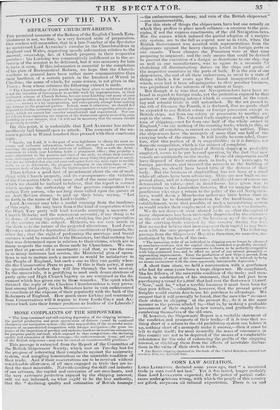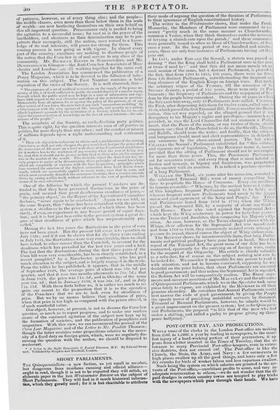of patience, however, as of every thing else; and the
people— the middle classes, even more than those below them in the scale of wealth—are now bestirring themselves on their own behalf on this all-important question. Perseverance only is needed to bring the agitation to a successful issue; for vast as is the power of the
landholders, and obstinate as their determination may be to per- petuate their monopoly, still the nation, once roused to a know- ledge of its real interests, will prove too strong for them. This rousing process is now going on with vigour. In almost every part of the country, exertions are making to 'disabuse people of the notion that the Corn-law is of real service to any class of the community. Mr. Bregrissr ESCOTT in Scmersetshire, and Mr. Dream STOUP; in Glasgow—the Anti-Corn-law Assoeiators of Man- chester and London—ere all working together for the same end.
The London Association has commenced the publication of a Penny Magazine, which is to be devoted to the diffusion of infor- mation on this subject. The First Number contains a brief exposition of the views of the Society. It is well observed, that- " Theexeitence of a set of artificial net rictions on the supply of the prime ne- ressaty of life, is of itself sufficient to justify the establishment of a regular organ, through which the public mind may be kept in a state of information and vigi- lance with regard to the real character and effect of the restrictions in question. Abstractedly from all opinion for or against the policy of the present, or of any other system of l'inn-laws, the lucre fact of any such ' momentous meddling ' by a Covernment with the very springs of life, strength, and security to a nation, affords legitimate grounds for the institution of a Society which has for its sole object the communication of knowledge on the first of social interests—the sub- aistence of the people."
The members of the Society, as such, disclaim party politics. This is quite right, for the question interests men of all parties in polities, far more deeply than any other; and the comfort or misery of millions depends upon a right understanding and settlement of it.
" 'Their sole object is to endeavour to obtain such a modification of the existing Corn-laws, as shall not only cheapen the poor maul's loaf, but put the prices of all the necessaries of life more on a level with those of his Continental neighbours; for it matters less to the workman of any country what the cost of living may be, than that it should not be greater to him than to those who are his competi- tors in the market of the world. This desirable object the Anti-Corn -law so • ciety propose to arrive at by disseminating those principles of sound knowledge which are completely at variance with the lairs m question,—principles which have received the sanction of the highest authorities from Lord Bacon down- wards, which are successfully applied to every trade, save that in corn, and which must eventually demolish the monstrous doctrine, that a country can only thrive by raising within itself, without reference to the cost of production, the means of its own subsistence."
One of the fallacies by which the present Cern-laws are de- fended is, that they have prevented fluctuations in the price of grain, and secured that great desideratum steadiness of price,- " the pi hoary object," as the Report of the Agricultural Committee declares, "never again to be overlooked." Again we are told, itt the same Report, that " there has been coincident with the present system a steadiness in the price of corn, of which there has been rarely, if ever, an experience in any forieer period of equal dura- tion; and it is but just to a-crib° to the present system a great de- gree of that steadiness of price which has unquestionably pre- vailed."
During the la-t two years the fluctuations in the price of corn have not been great. But. the present bill came {mitt) operation in July 1328; and if it can be shown that for the three years ending in July 1831, the fluctuations were very considerable, then we shall have to look to other causes than the Corn-bill, to account for the steadiness which has prevailed for the last two years and a half. The !het that the fluctuations during the first three years of the Corn bill were very considerable, has been clearly established, in a recent pamphlet,* by a Manchester gentleman, who has paid much attention to the subject. and is largely engaged in the trade. From the tables he has published, it appears, that in the middle of September 1828, the average price of wheat was 59s. 9d. per quarter, and that it rose two months afterwards to 76s. 7d.; that in June 1829, the price was 71s. 3d., and in October of the same year 55s. 4d. i • that in Januar y 1830, it was 568. Id, and in July 7-Is. 1Id. With these facts before us, it is rather too much to re- quire our assent to the proposition that it is to the operation of the Corn-laws that we are to look even for steadiness of price. But we by no means believe that steadiness of price, when that price is too high as compared with the prices abroad, is of such wonderful value.
Our object, however, at present, is not to discuss the Corn-law question, so much as to report progress, and to make our readers aware of the continual agitation of the subject now kept up by the formation of societies, and the publication of pamphlets and magazines. With this view, we can recommend the perusal of the Corn-Law Magazine and of the Letter to Mr. Poulett Thomson; though the latter contains some propositions relative to the neces- sity of a fixed duty on foreign grain, which, were we regularly dis- cussing the question with the author, we should be disposed to controvert.
• A Letter to the Right Honourable C. Poolett Thomsox, M.P. By Edward Swan- 'uick. Publisbedby Simpkin and Marshall, Loudon.























 Previous page
Previous page